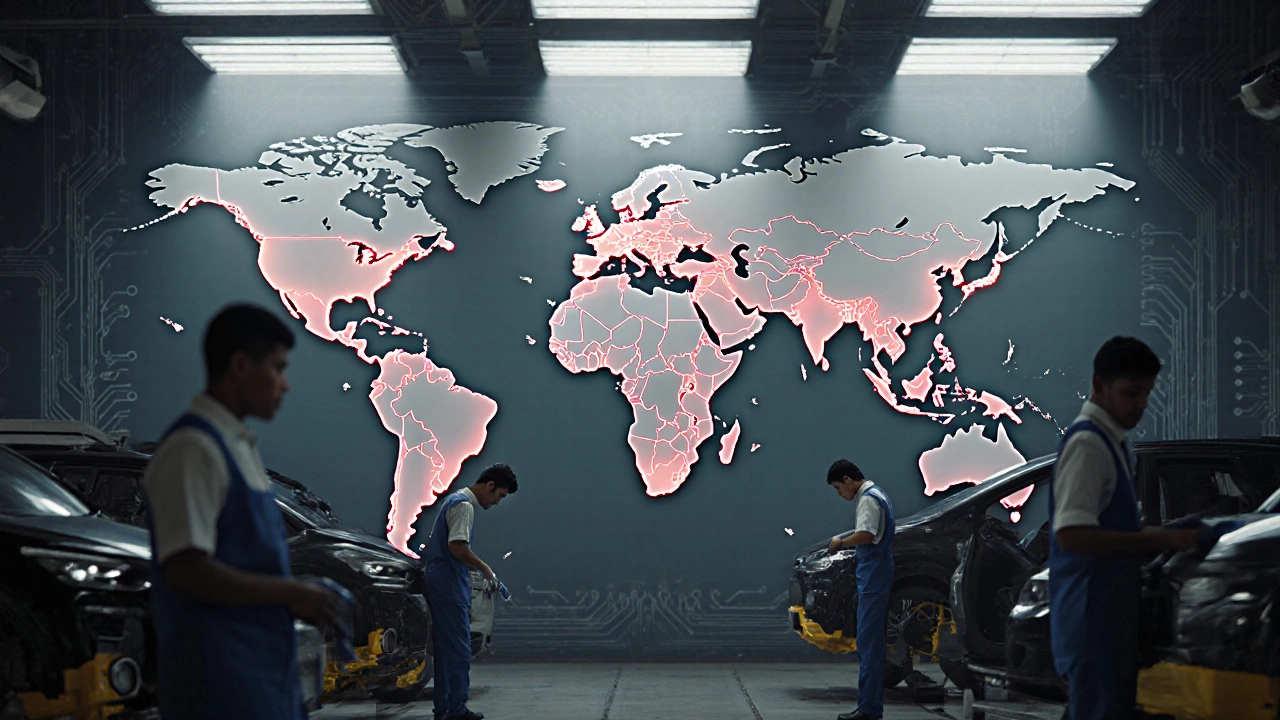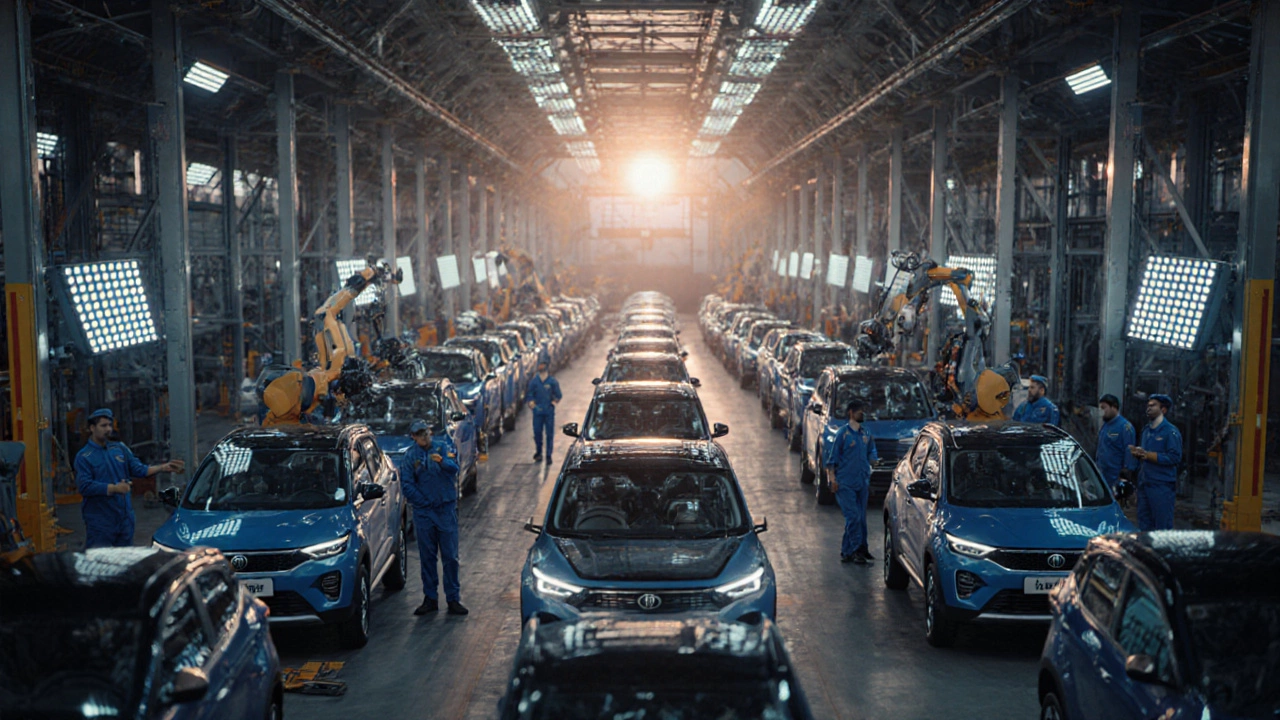Indian Car Manufacturing Quiz
When you think of cars made in India, you’re not just thinking of assembly lines-you’re thinking of a homegrown industry that’s grown from modest beginnings into one of the world’s top five vehicle producers. India doesn’t just assemble foreign cars anymore. It designs, engineers, and builds its own vehicles for millions of drivers across the country and exports them to over 80 nations. So, which car brands are actually made in India? The answer isn’t just one name-it’s a handful of companies that have turned local demand into global influence.
Tata Motors: The pioneer of Indian carmaking
Tata Motors is the oldest and largest car manufacturer based in India. Founded in 1945, it didn’t start with passenger cars-it built trucks and buses. But in 1991, after India opened its economy, Tata launched the Tata Indica, the country’s first fully indigenous hatchback. That car was a game-changer. It was affordable, reliable, and built entirely in India with local parts. Today, Tata Motors sells cars like the Tiago, Tigor, Nexon, and Harrier under its own brand. It also owns Jaguar Land Rover, but that’s a separate story-the cars sold under the Tata name are made in India, from the ground up.
The company’s electric vehicle push is just as strong. The Tata Nexon EV is one of India’s best-selling electric SUVs, with over 100,000 units sold since 2020. Its factory in Sanand, Gujarat, churns out nearly 1,000 EVs a day. That’s not just manufacturing-it’s a shift in how India sees mobility.
Mahindra & Mahindra: From tractors to SUVs
If you’ve ever seen a rugged SUV in rural India or on mountain roads, it’s likely a Mahindra. The company started in 1945 making utility vehicles and tractors. In the 1980s, it partnered with Jeep to build the iconic Mahindra Jeep, which became the go-to vehicle for farmers, police, and the military. Later, Mahindra launched its own models like the Scorpio, XUV500, and Thar.
The Thar, especially, became a cult favorite. It’s a modern take on the classic Jeep, with a body-on-frame design, 4x4 capability, and a price tag under ₹10 lakh. Over 150,000 Thars have been sold since 2020. Mahindra also makes electric cars like the XUV400, India’s first affordable EV with over 400 km of range. All Mahindra vehicles are designed and assembled in India-factories in Mumbai, Pune, and Kandivali handle production.
Maruti Suzuki: The mass-market king
Maruti Suzuki isn’t Indian-owned, but it’s the most Indian car brand in terms of production and presence. Suzuki Motor Corporation of Japan owns 56% of Maruti, but the company has been operating in India since 1981. Nearly every car sold under the Maruti name-like the Alto, Wagon R, Swift, and Dzire-is made in India. Its plants in Gurgaon, Manesar, and Gujarat produce over 4 million vehicles a year.
Why does this matter? Because Maruti accounts for over 40% of India’s total car sales. It’s not just a Japanese brand-it’s the backbone of India’s automotive industry. Maruti’s success comes from making simple, fuel-efficient cars that work on Indian roads. It also leads in electric mobility with the Maruti Eeco EV and upcoming Alto EV. Even though Suzuki is foreign, the cars you see on Indian streets are made by Indian workers, using Indian supply chains, and built for Indian conditions.

Hyundai India: Global brand, local production
Hyundai is a South Korean company, but its Indian operations are massive. Hyundai opened its first plant in Chennai in 1996 and now produces over 1.5 million cars a year in India. Models like the i10, Venue, Creta, and Alcazar are designed with Indian buyers in mind. The Creta, for example, is sold in over 50 countries-but it was engineered in India and built here.
Hyundai’s Indian plant is one of the most automated in Asia. It uses robotics, AI quality checks, and local suppliers for 85% of its parts. The company even exports Indian-made Hyundais to Europe and Africa. So while Hyundai isn’t Indian-owned, its Indian-made cars are a major part of the country’s manufacturing output.
Toyota Kirloskar: Quality and reliability made in India
Toyota entered India in 1997 through a joint venture with the Kirloskar Group. Today, it makes cars like the Innova Crysta, Fortuner, and Glanza in Karnataka. Toyota’s India plant is known for its strict quality standards. Every car undergoes 1,200+ quality checks before leaving the factory.
The Innova Crysta is India’s most popular MPV. It’s built for long drives, rough roads, and family use-all things Indian customers demand. Toyota also launched the Urban Cruiser Hyryder, a hybrid SUV made in India, and plans to roll out more EVs by 2027. While Toyota is Japanese, its Indian-made vehicles are designed for local needs and built with local labor and parts.

Other Indian car brands you should know
Beyond the big names, there are smaller Indian players making waves. Force Motors makes utility vehicles and SUVs like the Force Gurkha, used by off-road enthusiasts and the armed forces. TVS Motor is better known for bikes, but it’s expanding into electric three-wheelers for last-mile delivery. Ola Electric and Ather Energy aren’t traditional carmakers, but they’re India’s biggest EV scooter brands-and they’re part of the same manufacturing ecosystem.
Startups like Stellantis India (a joint venture with Peugeot and Citroën) and Kia India (a South Korean brand with local production) are also ramping up. Kia’s Seltos and Sonet are made in Anantapur, Andhra Pradesh, and exported to Africa and Latin America.
Why it matters that these cars are made in India
When a car is made in India, it’s not just about where the assembly line is. It’s about jobs, supply chains, and innovation. Over 3 million people work directly in India’s auto industry. Nearly 80% of parts for Indian-made cars come from Indian suppliers-steel, electronics, tires, plastics. That’s billions of rupees staying in the country.
India’s government pushes this through policies like the Production Linked Incentive (PLI) scheme, which gives cash rewards to companies that make EVs and advanced vehicles locally. In 2024, India exported over 1.2 million vehicles-mostly made by Tata, Mahindra, Hyundai, and Kia.
Indian-made cars are now trusted abroad. The Tata Nexon EV is sold in Europe. The Mahindra XUV700 is exported to South Africa. The Hyundai Creta is a top seller in Australia. This isn’t just about selling cars-it’s about proving that India can build world-class vehicles.
What’s next for Indian car manufacturing?
Electric vehicles are the future. By 2030, over 40% of new cars sold in India are expected to be electric. Tata and Mahindra are leading this shift. Maruti and Hyundai are investing billions in EV factories. Even Toyota plans to launch five EV models in India by 2027.
Autonomous driving tech is also being developed here. Companies like Tata and Mahindra are partnering with Indian AI startups to build self-driving systems tailored for Indian traffic-potholes, cows, rickshaws, and all.
India’s car industry is no longer copying global designs. It’s creating its own. The next generation of affordable, smart, electric cars will come from Indian labs, Indian factories, and Indian drivers.
Are all Maruti Suzuki cars made in India?
Yes, every Maruti Suzuki car sold in India is manufactured locally in plants in Gurgaon, Manesar, and Gujarat. While Suzuki Motor Corporation of Japan owns a majority stake, the vehicles are designed, assembled, and supplied with parts from Indian vendors. Even export models from India are built in these factories.
Is Tata Motors the only fully Indian-owned car brand?
Tata Motors is the only major carmaker in India that is fully Indian-owned and headquartered in India. Other brands like Mahindra are Indian-owned too, but they’re part of a larger conglomerate. Hyundai, Toyota, Kia, and others are foreign-owned but manufacture their vehicles in India. Tata stands out because it designs, engineers, and produces its entire lineup locally without foreign parent control.
Which Indian car brand sells the most electric vehicles?
Tata Motors leads the EV market in India. In 2024, it sold over 180,000 electric vehicles, mostly the Nexon EV and Tigor EV. Mahindra is second with around 75,000 EVs sold, mainly the XUV400. Maruti Suzuki’s EV sales are still small, but its Alto EV is expected to boost numbers in 2025.
Are cars made in India of good quality?
Yes. Indian-made cars meet global safety and quality standards. Tata, Mahindra, Hyundai, and Toyota factories in India follow international protocols like ISO 9001 and IATF 16949. Many models receive 5-star safety ratings from Global NCAP. Indian-made cars are tested for extreme heat, dust, and rough roads-conditions that many global markets don’t require. That makes them more durable in tough environments.
Can I buy an Indian-made car outside India?
Yes. Cars made in India are exported to over 80 countries. The Tata Nexon EV is sold in the UK, Norway, and Thailand. The Mahindra XUV700 is available in South Africa and the Middle East. Hyundai’s Creta and Kia’s Seltos, both made in India, are sold in Australia and Latin America. You can find these models at authorized dealerships abroad.
